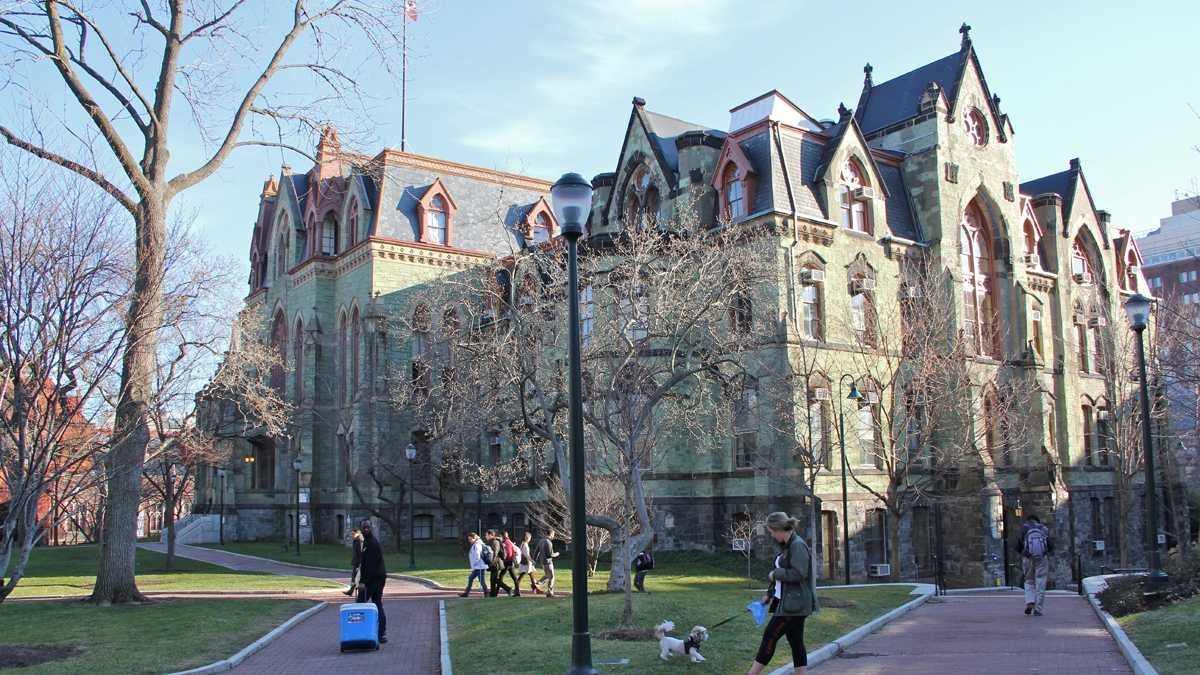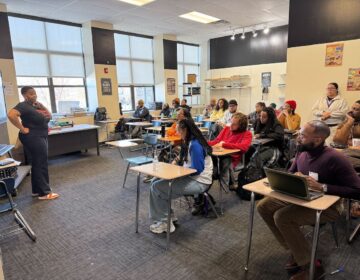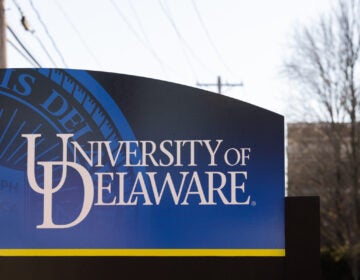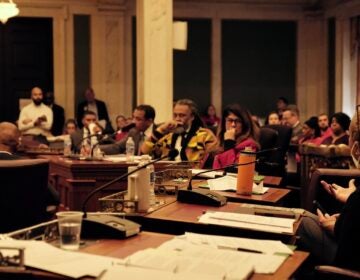Penn grad students battle administration, clock in effort to unionize

College Hall on the University of Pennsylvania campus. (Emma Lee/WHYY)
University of Pennsylvania graduate students are battling their administration — and perhaps the clock — in an attempt to unionize.
On Wednesday, lawyers representing graduate student workers and lawyers representing the university met in a hearing before the regional office of the National Labor Relations Board. The meeting’s primary purpose was to determine which graduate student works would be eligible for a unionization vote and when that vote would occur.
But union backers see an ulterior motive embedded in the vigor with which the administration is pleading its case.
“I honestly think that every argument they make is geared toward delay,” said Emma Teitelman, a doctoral candidate who studies 19th-century labor history.
A University of Pennsylvania representative declined to comment on the university’s legal tactics.
There are two vacancies on the NLRB, which decides the types of workers eligible to unionize. In 2016, the NLRB reversed precedent and said graduate student workers at Columbia University could form a bargaining unit. That ruling unleashed a flood of labor activity on elite college campuses.
But some union activists think the window could close as soon as President Donald Trump fills the two open NLRB slots and a new case comes before the reconstituted board.
This collision of national and local politics was on display Wednesday, all centering around the central question of whether graduate students who teach classes and conduct research should be considered employees.
Penn officials — like officials at almost all of their peer institutions — say graduate students enroll primarily to learn, and the work they do while attaining their degrees is part of their academic training. Many graduate students argue their labor is essential to the university’s function and equivalent to labor provided by other types of workers.
If the student workers succeed in their unionization efforts, they would then be able to collectively bargain with the university on issues of pay, insurance coverage, complaint policy, and dismissal.
Taking the first formal step toward unionization, Penn graduate students have already filed a petition to the NLRB to form a union with the American Federation of Teachers. The next major step would be for eligible student workers to take an up-down vote on unionization, with a simple majority deciding the outcome. But before that vote can happen, the regional office of the NLRB has to help determine who can vote and when that vote will happen.
Lawyers for the University of Pennsylvania pushed for a fall vote, saying that even a mail-ballot vote over the summer would be difficult to execute given that many graduate students travel for pleasure or research. The university’s attorneys also challenged the composition of the bargaining unit proposed by GET-UP, the group driving Penn’s unionization efforts.
GET-UP petitioned for a bargaining unit to represent seven schools, while excluding two that have graduate workers: the Wharton School of Business and the School of Engineering and Applied Science. Penn lawyers argued that the exclusion of those two schools was based solely on the fact that their students were less likely to vote “yes.”
“It is an arbitrary unit of students they have cobbled together for strategic reasons in order to win,” said Daniel Johns, a partner at Ballard Spahr who represented the university at the hearing.
Penn’s graduate students differed from those at Columbia University, Johns said, because they were less likely to teach undergraduates and could not be fired for under-performance in the same way as graduate workers at Columbia.
Amy Rosenberger, a partner at Willig, Williams, and Davidson, countered that Penn student workers performed many of the same tasks as graduate students elsewhere. She also pushed for a summer vote and argued that the exclusion of two schools was permitted under case law.
Teitelman said Penn and Columbia were “trying to undermine a democratic process” by stalling and waiting for a new NLRB to take root. Pro-union students said collective bargaining will create more procedural uniformity around the treatment of graduate student workers and secure better pay and working conditions.
Not all Penn students agree.
China Byrns, studying toward a dual MD and PhD, believes graduate students receive generous benefits and that forming a union could ultimately erode their position. She worries, in particular, that it could restrict the number of slots open to future candidates.
“I really disagree personally … that we need to be saved from our employer,” she said.
Byrns, who is part of an anti-union group at Penn, also senses recklessness in the push for a quick union vote.
“I don’t think rushing to get this completed is the right way to approach it,” she said. “Unions are really hard to remove once they’re in place.”
WHYY is your source for fact-based, in-depth journalism and information. As a nonprofit organization, we rely on financial support from readers like you. Please give today.





